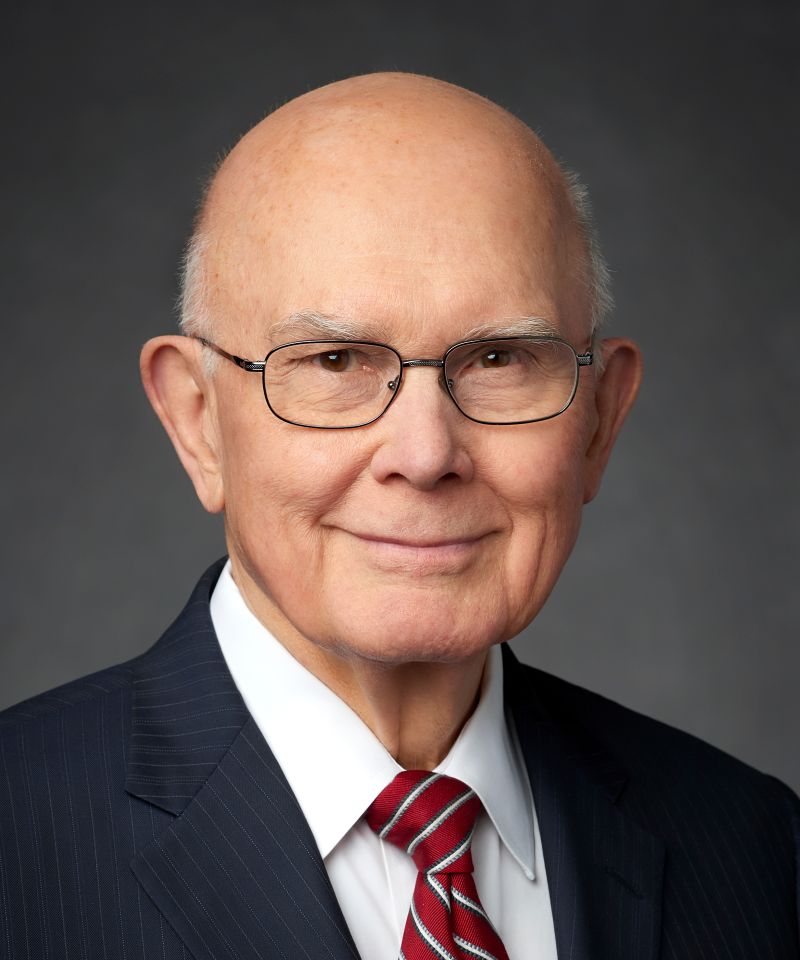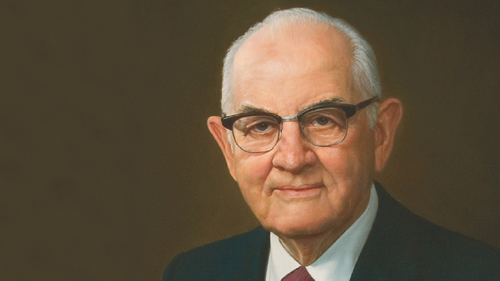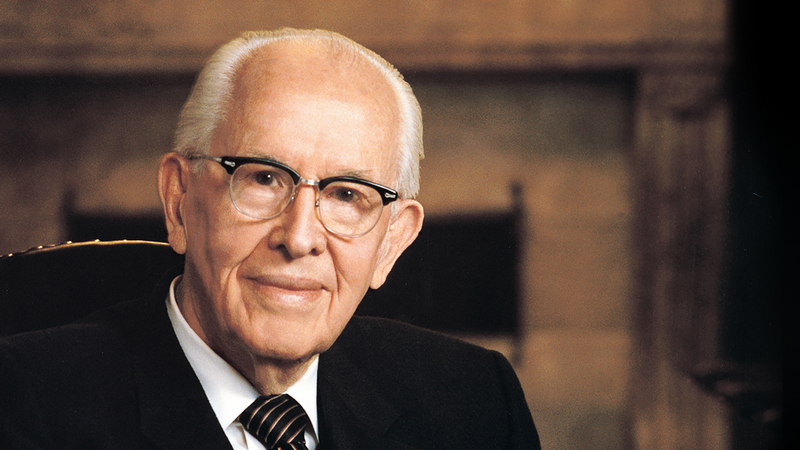Revelation
adapted from a discourse given in the Lafayette 3rd Ward, Lafayette Indiana Stake, 29 June 2014
A couple of nights ago, I was sitting on my couch, computer in my lap, preparing my talk for today, and I saw that I had a new email. Surprise! Like that’s a big deal, right? It probably happens hundreds of times during the average preparation for a talk, but for some reason, this one caught my eye. It was advertising a “smart” device.
Now of course, pretty much all of us have smart devices. We have smart computers and smart phones and smart TVs and smart cars and smart thermostats; the list goes on and on. But again, this one really caught my eye, because I couldn’t help but wonder what on earth would be the purpose of a smart basketball.
 Seriously, I’m wondering, by a show of hands, does anyone own a smart basketball? Anyone? Even my bishop, who is CEO of the local YMCA, doesn’t own one of these! But you know, it’s only $250, which is only like ten times the price of a pretty good regular basketball. And what’s more, the one in the email is actually the official Smart Basketball of the National Association of Basketball Coaches, which implies there’s more than one of these things! You think the iPhone vs. Android wars are intense? Now they’re taking personal preference in electronics and crossing it with sports. Toss in a little politics, and this is like the nuclear option for flame wars.
Seriously, I’m wondering, by a show of hands, does anyone own a smart basketball? Anyone? Even my bishop, who is CEO of the local YMCA, doesn’t own one of these! But you know, it’s only $250, which is only like ten times the price of a pretty good regular basketball. And what’s more, the one in the email is actually the official Smart Basketball of the National Association of Basketball Coaches, which implies there’s more than one of these things! You think the iPhone vs. Android wars are intense? Now they’re taking personal preference in electronics and crossing it with sports. Toss in a little politics, and this is like the nuclear option for flame wars.
But let’s get back to the email: not only did this well-timed message perform the all-important service of alerting me to the smart basketball’s existence, it also informed me I could it get on sale for only $199.95! What a deal, right? Now for only $200, I can get a basketball that integrates with my iPad. It tells me how many times I dribble it, and how fast. It tells me how many shots I’ve taken, how many I’ve actually made, and how long it took me to do so. Plus, when I make a shot, it tells me the angle at which the shot came down! It even tells me—and I don’t how I’ve ever lived without this—the speed of the backspin, in revolutions per minute! The amount of information this basketball can give me is frankly amazing.
And yet, you know what? I don’t really care that much. I mean, if someone were trying out for the NBA (or maybe were a CEO at the YMCA), I could totally see why he’d want something like this. But me? I’m sorry, but personally—speaking exclusively for me, myself, and I—I can think of a lot of things I’d rather spend 200 bucks on than a basketball with an “app for that”. I mean, don’t get me wrong; it would definitely give me a lot more feedback than the $10 basketball I got at Walmart, a while back, but what am I going to do with that level of feedback?
And then it hit me.
My talk today—which, in case you’ve forgotten by now, is the one I was working on, when I learned about this amazing basketball—is on personal revelation. And what is personal revelation but feedback? When we ask God a question, He gives us feedback. When we’re in a tough situation and He wants to help us, He gives us feedback. Wherever we are, whatever we’re doing, when we receive personal revelation, it’s just basically feedback! And while for most us, it might not be worth it to spend a couple hundred bucks on extra feedback from a basketball, how much is it worth to each of us to get some extra feedback—even a lot of extra feedback—from our Heavenly Father?
Paying the Price
I’ve told this story many times, so it will probably be a rerun for some of you, but I’d like to share the greatest revelation I’ve ever received: my knowledge that God lives. I happened one night, just over 23 years ago. It was the night of my junior prom, but my then girlfriend, now wife, Anna, I and lived 800 miles apart, and her parents (wisely) wouldn’t let her fly out for it. So, I skipped prom for a late-night phone call with her. In the course of that call, Anna shared her testimony with me, and it left me in absolute awe.
When we finally got off the phone—about 1:30 in the morning—I tried to sleep, but couldn’t. I lay there for hours, tossing and turning, trying to let my mind rest. I didn’t know if what she’d told me was true, but I knew I had to find out, and I had no idea how to do that. Finally, at about quarter after five, that still, small voice entered the back of my mind. It was the first time I’d really experienced the promptings of the Holy Ghost, and I didn’t know that’s what it was, but it was almost audible. It reminded me of what I had learned as a little boy, in my Protestant Sunday School: “If you want to be forgiven, Jesus can forgive you.” I did, and for the first time in my life, I prayed.
“God?” I began. “I don’t know if you’re there.” (long pause) “And if you are there, I don’t know if you’re listening.” (long pause) “And if you are listening, I don’t know if you care.” (long pause) “But I’m sorry.” I ran down every sinful thing I could think of in my entire life, begging Heavenly Father for forgiveness, and when I finally got done, I continued, “…and if there’s anything else that I’ve forgotten, I’m sorry for that, too.”
I have never felt the Spirit as strongly as I did, that day. I lay there for what seemed like hours, but was probably more like fifteen seconds, wholly unable to move, literally and completely paralyzed by the immense power that had suddenly come over my entire body. And finally, just when I thought I couldn’t take any more, I passed out. I have since thought on many occasions that my experience paralleled that of the king of the Lamanites, when he first learned the gospel from the prophet Aaron:
[T]he king did bow down before the Lord, upon his knees; yea, even he did prostrate himself upon the earth, and cried mightily, saying: O God, Aaron hath told me that there is a God; and if there is a God, and if thou art God, wilt thou make thyself known unto me, and I will give away all my sins to know thee…. And now when the king had said these words, he was struck as if he were dead.1
Like the old king, I was willing to pay more than I could imagine to know God, to receive revelation from Him, to know that He was there. $200 is one thing; all one’s sins is another. A smart basketball might change the way you play a game, but repentance can change the way you live your life.
|
President Spencer W. Kimball (1895-1985) |
|
President Ezra Taft Benson (1899-1994) |
It’s interesting to me that to receive the word of God, we must first know the word of God. We are taught in the ninth section of the Doctrine and Covenants that revelation is preceded by studying things out in our minds4, so it makes sense that by familiarizing ourselves with what God has said in the past, we can more easily understand what He has to say in the present—which is, of course, the definition of personal revelation.
Hearing His Words
As a holder of the Melchizedek Priesthood, I am regularly called upon to bless others. One such time was five and a half years ago, when Anna was pregnant with what was to be our third living child. Suffice to say: things were not looking good. Her obstetrician was extremely pessimistic, and given our long history of infertility, we were terrified that our little miracle—yet another child we were supposed to be unable to conceive in the first place—was about to meet the same fate as all but one of our earlier pregnancies. Anna came to me and requested a blessing. I asked for a few minutes to pray and retreated to our room to beg for guidance. I was about to give one of the most important blessings of my life, and I knew there was no way I could give it without significant revelation from God. After prayer, I returned, knowing from experience that Heavenly Father would guide my mind and lips to say the things my wife needed to hear. I placed my hands on her hand; I blessed her that everything would be fine, that the child within her would be born happy and healthy in just a few months. We were ecstatic. We were hopeful. We were faithful. We knew that Father could protect this little child, just like He had protected our son David, two years previous. Despite the obstetrician’s consistent assertions to the contrary, we knew that our tiny child would be born in August, happy and healthy, because the word of God had said so.
Unfortunately, there was a huge problem: in that particular instance, the word of God had not said so. Two weeks later, as we entered the second trimester, that tiny baby was born. He was perfectly formed and beautiful, just much, much too young to survive delivery. As we held his lifeless body in our hands, we couldn’t even begin to understand what had happened. We knew that God cannot lie[fn], so where had the communication broken down? Obviously, it was with me. I had failed, and my failure was immense. But what’s more, I was lost. I had placed my own, seemingly righteous, desires ahead of His perfect revelation. How many times had I done that before? How could I possibly know? If even my ability to receive revelation was called into question, how could I possibly trust any revelation I’d ever received? My knowledge that the Church is true, that Jesus is the Christ, even that God lives, are all based on the reliability of personal revelation. Without that reliability, without the ability to trust myself implicitly, my entire testimony of the gospel was called seriously into question. I could recover from the death of my son, but I didn’t know how to recover from the death of my faith in personal revelation.

|
| Elder Dallin H. Oaks |
Ideally, the elder who officiates will be so in tune with the Spirit of the Lord that he will know and declare the will of the Lord in the words of the blessing. … However, like most who officiate in healing blessings, I have often struggled with uncertainty on the words I should say. For a variety of causes, every elder experiences increases and decreases in his level of sensitivity to the promptings of the Spirit. Every elder who gives a blessing is subject to influence by what he desires for the person afflicted. Each of these and other mortal imperfections can influence the words we speak.5
Needless to say, I was amazed by these words. An Apostle of the Lord knew what I was going through. He had suffered the same challenges, and he had overcome them. His faith was indubitably solid, and mine could be, too. About a month later, I wrote Elder Oaks a letter thanking him for his words. I told him, “For the first time in my life, I can honestly say that a particular discourse was ‘meant for me.’” I truly believe that: my loving Heavenly Father saw my struggles and gave me the “balm of Gilead” I so desperately needed. In this case, personal revelation came not during heartfelt prayer, but only following that prayer, following an intense trial of my faith, and through the words of one of God’s living, appointed servants.
Recognizing His Voice
Of course, all of this is wonderful, but perhaps the most important key to receiving revelation is knowing the voice of the Lord. The Savior taught, “My sheep hear my voice, and I know them, and they follow me.”6
Most of us, however, don’t understand this as fully as the people of Christ’s time. According to Bible scholar Fred H. Wight:When it becomes necessary to separate several flocks of sheep, one shepherd after another will stand up and call out: "Tahhoo! Tahhoo!" or a similar call of his own choosing. The sheep lift up their heads, and after a general scramble, begin following each one his own shepherd. They are thoroughly familiar with their own shepherd's tone of voice. Strangers have often used the same call, but their attempts to get the sheep to follow them always fail.7
If we are to be Christ’s sheep, we must know His voice so well that when another shepherd calls out “Tahhoo!”, we can discern it from the call of our Shepherd. The only way we can do this is to familiarize ourselves with His voice. We must know it as well as we know the voice of our own children or spouse or earthly parents. This is not something that can be done in a minute or a day; it is not something that comes through rote or casual communication. It requires consistent, deliberate conversation. It requires us to speak with Him—and, more importantly, to listen to His response—so frequently, so fervently that we can no longer be deceived. Recall when Satan commanded Moses to worship him: Moses responded, “[W]here is thy glory…? … I can judge between thee and God.”8 If we want to avoid deception as Moses did, we must know God as Moses did. How can we heed the invitation of the Master if we don’t even recognize His call?
God’s prophets and Apostles are always there to share His general counsel, but as Elder Jeffrey R. Holland stated, “We who are General Authorities and general officers are called to teach His general rules. You and we then lead specific lives and must seek the Lord’s guidance regarding specific circumstances.”9 Through personal revelation, each of us can receive that specific guidance; and by following that guidance, we can become all that our Heavenly Parents want us to be.
- Alma 22:17-18⌃
- Teachings of Spencer W. Kimball, 135⌃
- President Ezra Taft Benson, The Power of the Word, 156th Annual General Conference of The Church of Jesus Christ of Latter-day Saints⌃
- cf. Doctrine & Covenants 9:8⌃
- Elder Dallin H. Oaks, Healing the Sick, 180th Annual General Conference of The Church of Jesus Christ of Latter-day Saints⌃
- John 10:27⌃
- Fred H. Wight, Manner And Customs of Bible Lands: Chapter 18: Shepherd Life; The Care of Sheep and Goats, ©1953.⌃
- Moses 1:15⌃
- Jeffrey R. Holland, General Patterns and Specific Lives, 2008 Worldwide Leadership Training Meeting, p.3⌃



Comments
Post a Comment